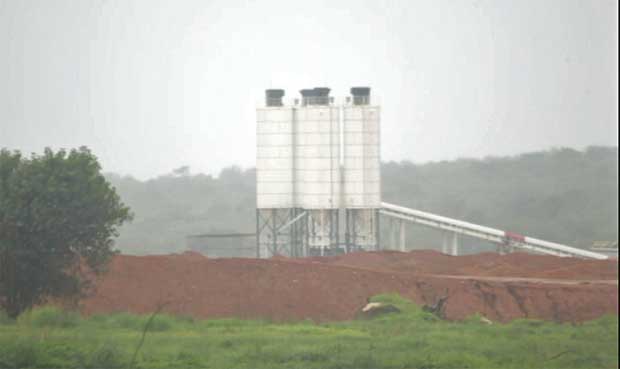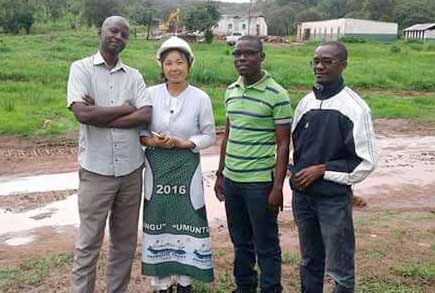I know that Zambia is very focused on environmental protection, but you are not doing as good as the Kenyans,” says Catherine Lu.
Lu is a representative of a Chinese mining company ironically called “African Brothers Corporation” that owns Mpande Limestone, a subsidiary of Chinese engineering giant Sinoma.
Mpande Limestone is setting up a mega US$48 million cement manufacturing plant about 49 kilometres south-east of Lusaka.
Once operational, the mining plant may see a further reduction of cement prices on the already competitive market.
But environmental activist David Ngwenyama is concerned that the Chinese firm may not have done an Environmental Impact Assessment (EIA) before settling on this particular land.
It is too late though, because as Ngwenyama rushes to the site with this reporter, to see if indeed the plant has been set up, the Chinese firm is already settling down and demolishing buildings; while close to hundred families have been displaced.

“Cleary these guys are flouting the environmental laws. They can’t do this before doing an impact assessment for this specific land. They can’t do this before all the people are fully compensated,” says Ngwenyama as he watches an earthmover demolishing the community Mosque.
“It seems they are using money and influence to drive people away from their land without a clear resettlement plan. The Chinese have clearly violated their duty and pledge to the local people.”
Indeed, Lu is clad in a white shirt, a safety helmet and a Patriotic Front chitenge material, which was later said to have been given to her by President Edgar Lungu himself.
She is busy supervising the demolition of community buildings, but gets concerned after seeing Ngwenyama, hundred metres away, with a group of journalists.
Majestically, Lu walks over to Ngwenyama’s vehicle and before greeting anybody, she asks: “I see you are taking pictures. What are you doing on my land?”
“This is your land? Is it not a road?” Ngwenyama asks.
“Yes it is a road, but it is in my land. This whole land now belongs to me,” she responds in perfect English with an obvious accent.
Apparently, even the government clinic, a few metres away is facing demolition and the workers have already been told to relocate as they await the construction of a new clinic further up the mountains.
Meanwhile, Lu is still insisting that Ngwenyama and his crew are trespassing on her land.

“Who sent you here? I know someone sent you, who are you working with?” she asks.
But almost immediately, the conversation gets more interesting as Lu realises that she has encountered Ngwenyama before.
“What is your name?” she asks everyone in the vehicle, and exclaims upon hearing Ngwenyama’s name. “David! I know you. We met before at court, you remember?”
Ngwenyama along with some local NGO’s is in court challenging a move by Zambezi resources limited to set up a mining plant in the Lower Zambezi National Park. Lu was working with the defendant at the time, but thinks Ngwenyama did a good job in the case and she thanks him instead for being resilient in the fight for environmental protection.
While Lu is still glossing over how the Zambezi Resource case helped her new company, this reporter then asks if Mpande Mining did an Environmental Impact Assessment before the plant was built.
“For that one, Lu responds, “we want to give the opportunity for Zambians to do. That is why we hired someone to do for us. We’re not directly involved.”
“For the environmental protection thing, I know that Zambia is very focused, but you are not doing as good as the Kenyans. Kenyans really know how to do things for game (wildlife) and keeping the environment…”
She explains that some Zambian government officials claim a lot of money when a foreigner is applying for any permit.
“When I first came into this country, I was very timid, but I am not intimidated now. I tried to get help from someone to get me a work permit, but they got my money and disappeared,” she complained.
When asked why she doesn’t directly apply for a work permit on her own, Lu responds with another question: “Do you know what happens when this skin goes into a government office to ask for anything? Money, very good, a lot of money, so I just gave up.”
Asked if she still needed help to get a work permit, Lu says “not any more, I don’t need it I found a solution. I married a Zambian husband and I don’t need a work permit. I have a Bemba name; Chanda.”
She adds that the man on the chitenge gave her the material as a present.
“Of course I know him, President Lungu. He gave it to me,” she says in response to the question of whether she knew the person she was wearing.

As a matter of fact, Lu is feeling so free in her newly found country that she even asks for a photograph with Ngwenyama and his news crew.
Lu is beautiful and witty. She shares stories about her experiences working in Zambia and the disrespectful conduct of children in her community.
“One boy watches me everyday when I am cycling. This other day, he saw me coming and chased after me then he slapped my buttocks like that (demonstrating). Now I could tell that this boy was very young, but he was naughty. From the way he touched me, I could tell that he knew a lot of things, the way he touched me, I felt something,” she narrated to the laughter of her small audience.
Ngwenyama is here on a mission though. He knows that some villagers were not compensated before being displaced. He also knows that the Chinese did not get approval from ZEMA for this particular land before setting up the plant and he wants answers from Lu before she goes back to supervise the demolition.
So did you compensate the villagers before moving them?” he asks.
“Yes. As far as I know there is only one gentleman who is not happy. Mr Idriss. That mudala (old man).”
“You said Mr Idriss is the only problem but was he not part of the [community compensation] meeting? How is he a problem?” Ngwenyama asks.
“He is not a problem, let me rectify this matter,” she says. “He is someone who can really let you focus on what you are saying, (and) then he will say this one, you didn’t do good enough.”
Idriss Mutara is a leader of the Muslim community and a representative of some residents who have reacted furiously to the action taken by the Chinese company.
He was away when Lu and her men were demolishing the Mosque.
When he was called for a reaction on the matter, Mutara expressed shock that the Chinese had gone ahead to rase the holy building.
“We never came to any conclusion but I was surprised, last evening I received a letter authorising the Chinese to demolish the Mosque.
Mutara knows that the land in question is customary and falls under Chieftainess Nkomesha who gave it to the Muslim community.
“So permission should have come from the Chieftainess. I don’t know whether they have done it dubiously… they have some connections there (in government) and they have used those connections to pressurise the Muslim community to handover the Mosque,” said Mutara.
Meanwhile, according to the 138-page Environmental Impact Assessment report submitted to the Zambia Environmental Management Agency (ZEMA), Mpande Limestone was to be located at Maimbo Village in Kafue District.
But the mine owners moved the plant from Kafue District to Chiyeya Village of Chongwe district, about 15 kilometres away, without submitting another Environmental Impact Assessment to ZEMA for approval.
In response to a query from News Diggers! ZEMA confirmed receiving and approving an EIA for the project by Mpande Limestone, insisting the permit did not include relocation.
“The issues you raised are concerns that have been received by ZEMA and are currently under investigation. These investigations have not yet been completed,” ZEMA public relations manager Irene Lungu said in response to a press query.
Mpande Mine was first owned by an Australian prospecting company, Zambezi Resources Limited (ZRL) before it changed ownership to African Brothers Corporation (ABC) Limited.























